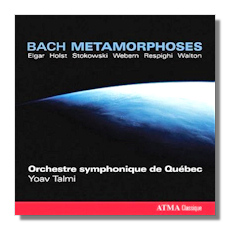
The Internet's Premier Classical Music Source
Related Links
-
J.S. Bach Reviews
Walton Reviews - Latest Reviews
- More Reviews
-
By Composer
-
Collections
DVD & Blu-ray
Books
Concert Reviews
Articles/Interviews
Software
Audio
Search Amazon
Recommended Links
Site News
 CD Review
CD Review
Bach Métamorphoses

- Johann Sebastian Bach:
- Toccata and Fugue, BWV 565 (orch. Stokowski)
- Fugue in G Major, BWV 577 (Fugue à la gigue, orch. Holst)
- Fantasia and Fugue, BWV 537 (orch. Elgar)
- Italian Concerto, BWV 971 (orch. Talmi) 1
- Ricercata (Fuga à 6) from The Musical Offering, BWV 1079 (orch. Webern)
- Passacaglia and Fugue, BWV 582 (orch. Respighi)
- William Walton: The Wise Virgins (suite)
1 Alexander Weimann, harpsichord
Québec Symphony Orchestra/Yoav Talmi
Atma Classique ACD2-2570 DDD 74:32
Discs like this one are released every couple of years or so – off the top of the head I can think of one conducted by Ozawa (on Philips) and another by Slatkin (Chandos). Frankly, this is one of the more interesting ones, not just because of the broadness of the repertory, but because the performers take the repertory just seriously enough. The Elgar orchestration, for example, really isn't something that people should listen to unless they've had a few brandies. The fugue in particular is lurid … and I write this as someone who loves Elgar's music. Talmi and his Québecois musicians neither let Elgar down, nor drown him in his own contrivances, and everyone (including the listener) is consequently happier.
Symphonic arrangements of Bach's music – primarily organ music, but not exclusively – got off the ground in the 1900s with Leopold Stokowski, and it is fitting that this CD begins with Stokowski's rchestration of the familiar Toccata and Fugue. Stokowski didn't try to replicate the sound of an organ in this orchestration, but he did try to replicate the effect of an organ on its usual performance space, so reverberation is cleverly built in to the music, with long-held bass notes lingering into the following phrases. Respighi's arrangement of the towering Passacaglia and Fugue is cut from similar cloth, and it brings the CD to a brassy close. Talmi and the orchestra give its full-throated glories their due.
Talmi's wn arrangement of the Italian Concerto for harpsichord and orchestra is harmless fun. In spite of Bach's title, the music was conceived with a solo keyboard instrument in mind, so adding an orchestra doesn't really contribute anything important. Harpsichordist Weimann shares duties nicely, but I am sure he didn't need any help from the orchestra!
The other curiosity is Walton's suite from The Wise Virgins. This was a ballet created in 1940 for the Vic-Wells Ballet, with Margot Fonteyn and Michael Soames in the leading roles. Walton took the music from Bach's cantata movements, for the most part, and most people will recognize "Sheep may safely graze," which is the source of the suite's penultimate movement. Walton favored a more modest style of orchestration than heard elsewhere on this CD, probably because he knew that a ballet orchestra would tend to be smaller. Relatively speaking, Walton's arrangements are an oasis of subtlety.
When playing arrangements by Stokowski and Respighi, it is inevitable that the Québec Symphony Orchestra should be compared with the Philadelphia Orchestra. The fullness of the latter ensemble's sound is missing here, but this French-Canadian ensemble need not have an inferiority complex, because these are bright, alert readings, and not even the Philadelphia Orchestra of today can live up to the sonic standards set by Stokowski and Ormandy five and more decades ago. Talmi's conducting is very much in the plucky spirit of both of those maestros, however. The bright and detailed engineering also helps to make this CD enjoyable to everyone except the most hard-bitten purists.
Copyright © 2009, Raymond Tuttle





















